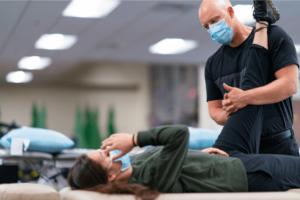To schedule an appointment for any of Summit Pacific’s therapy services, please call (360) 346-2298.
Physical Therapy
Our physical therapists are health care professionals who diagnose and treat individuals of all ages, from newborns to the very oldest, who have medical problems or other health-related conditions that limit their abilities to move and perform functional activities in their daily lives. We treat a variety of conditions including, but not limited to: pain, edema, pelvic floor dysfunction, balance, vestibular, developmental delay, muscular and skeletal conditions, and neurological conditions.
PTs examine each individual and develop a plan using proven treatment techniques to promote the ability to move, reduce pain, restore function, and prevent disability. In addition, PTs work with individuals to prevent the loss of mobility before it occurs by developing fitness- and wellness-oriented programs for healthier and more active lifestyles.

Occupational Therapy
Our occupational therapists help patients to perform the many normal activities of bathing and dressing safely and independently, managing household tasks and on-the-job activities. Our goal is to assist patients to recover as much functional ability as possible, including visual, cognitive, and general coordination skills.
Therapists help patients adapt and modify the environment to enhance their ability to function in their physical and social environments. They work on strength, endurance, range of motion, coordination and balance, memory, and orientation.

Speech Therapy
Our speech-language pathologist (SLP) works to assess, diagnose, treat and educate on speech, language, social communication, cognitive-communication, and swallowing/feeding disorders in children as young as four, teenagers, and adults. Our goal is to improve the patient’s quality of daily life and safety by providing the education, and tools to safely and effectively communicate and swallow.
You should ask your doctor for a referral to see an SLP if you relate to any of the following signs/symptoms: recent TBI or stroke, diagnosis of degenerative condition (ie. Dementia, ALS, Parkinson’s), new or worsening weakness of facial muscles, difficulty swallowing, coughing/choking while swallowing, difficulty producing speech sounds, stuttering, difficulty expressing wants/needs, not understood by others, social communication disorders, changes in voice, memory/orientation deficits, food aversion related to heightened sensitivity, and interest in the use of alternative augmentative communication devices (AAC). Check out our detailed overview for more information.


